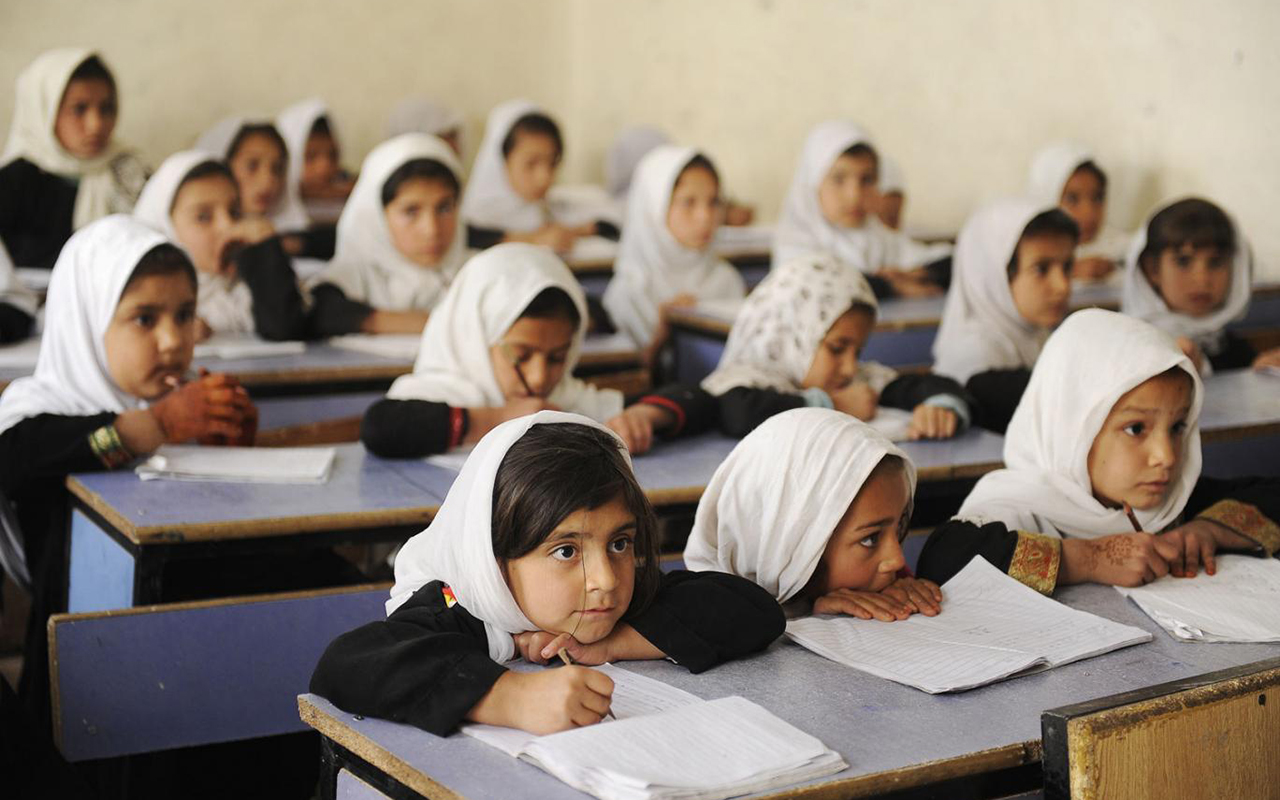KABUL (SW) – After the de-facto government assumed power in Afghanistan, schools for female students above the sixth grade have been closed until further notice by Hebatullah Akhundzada, the leader of the Islamic Emirate. Over this period, female students in Afghanistan have successfully completed the sixth grade in three rounds, but they have been unable to continue their studies beyond this level.
Salam Watandar interviewed 23 female students who have completed the 6th grade. Of them, 19 express disappointment over the prospect of their education remaining incomplete, while the remaining four express hope that schools will reopen for them. All 23 female students collectively appealed to the de-facto government to open the gates of the schools.
Nine-year-old Hasenat, 13-year-old Setayesh, and 10-year-old Masiha, recent graduates of their annual exams at ‘Zarghuna High School’ in Kabul city, share their dreams of achieving greatness and fame since the beginning of their school journey. However, the restriction preventing girls above the sixth grade from attending school has left them uncertain about their future.
Hasenat says: “They are all sad, the Islamic Emirate only allows boys to study. I want to become a doctor; because in our country, most people don’t observe hygiene.”
Setaish also says: “I wanted to become a good doctor in the future, I wanted to serve my country, but everything is closed for girls, my family wishes for me to study so much, become a doctor, and serve my country.”
On the other hand, the students interviewed in this report express that upon completing the sixth grade; they currently lack a specific plan for the upcoming year.
Naziya, a student at Rahman Mina High School in Kabul city, says: “I want the government to open schools so that girls can study.”
Meanwhile, four other students are hopeful for the reopening of their schools, mentioning that they have heard indications that schools will be opened for all girls at the beginning of the new academic year.
Rayhan, a 12-year-old graduate of the sixth grade from Bibi Rabia Girls’ High School, remains optimistic about the prospect of schools reopening for girls. “My family encourages me to stay hopeful, and I am optimistic. I believe that if I become a housewife, I won’t progress. Opening schools is crucial for the progress of our country,” she said.

The interviewees in this report emphasize the necessity of continuing education for their personal growth and the advancement of society. All 23 female students interviewed, who recently completed the sixth grade, express a collective desire for the reopening of schools for girls.
Dunya, a student at Bibi Rabia Girls’ High School, says: “I ask the Islamic Emirate to open the schools.”
Zainab, a student at Zarghuneh High School, also says: “I want the government to open the schools; because everywhere, women are not allowed to go to male doctors, and female doctors are needed, and schools should be opened so that girls can study.”
“I am 11 years old and in the sixth grade. I want the schools to open and to study the seventh grade. “I want to become a doctor in the future,” said Basiya, a student at Bibi Rabia Girls’ High School.
Ayesha, a student at Zarghuna High School, also says: “I feel very bad that they do not let me in school. I pray that the schools will be opened for us so that we can complete the school.”
These students further emphasize that it is essential for both men and women to acquire knowledge.
“I hope that the schools will open,” said another student who graduated from the sixth grade. “I want to become an astronaut and be the first Afghan woman to go to space, study physics and chemistry.”
Simultaneously, the teachers who taught the sixth-grade girls this year advocate for the opening of schools to all girls. They say that throughout the three years of education, their students consistently inquired them about the possibility of girls’ schools reopening beyond the sixth grade. The teachers admit to having no response other than justifying the de-facto government’s decisions for expediency.
The teachers also add that their students displayed a mix of hope and concern as the end of the school year approached.
Nouriya Sadat, a teacher in one of the schools in Kabul city, says: “Because the government promised to open the schools, this has almost caused concern.”
Sanam Sediqi, another teacher in one of the schools in Kabul, also says: “Not opening schools to girls has had a lot of effects on them. The questions they ask us about the opening of schools tell us when the schools will open. We want the government to open schools so that girls can work like men. They also have dreams to study.”
Nevertheless, education experts view the closure of schools for girls beyond the sixth grade as a cause for concern. They emphasize that the government should leverage educational opportunities for societal development and prevent these opportunities from evolving into significant challenges.
Jamaluddin Soleimani, an expert in the field of education, says: “Unfortunately, we spent another year while schools were closed, and this is challenging. This causes educational curriculum to fall behind and people’s distrust towards the government. The Ministry of Education should work on a comprehensive plan to prepare the ground for education. If we do not pay attention to this issue, we will fall under the educational crisis.”
Women’s rights activists also express deep concern about the ongoing situation, asserting that the closure of school gates will lead to irreparable losses across all sectors of the country.
Zahra Alizai, a women’s rights activist, emphasizes that women are integral contributors to the fabric of society. In her view, if women are denied education, a portion of the country’s society will suffer the consequences of ignorance.
We attempted to seek answers from Islamic Emirate officials regarding this issue. However, the Ministry of Education declined to respond, citing the lack of a spokesperson. Zabihullah Mujahid, the spokesperson of the de-facto government, responded to Salam Watandar’s inquiry, stating that this matter falls under the purview of the Ministry of Education.
It is should be mentioned that concerns about the non-opening of schools for girls beyond the sixth grade arise, even as Amir Khan Muttaqi, acting minister of Foreign Affairs, mentioned in a meeting at the Pakistan Strategic Studies Center that the ban on women and girls’ education in Afghanistan is not permanent.
ENDS






